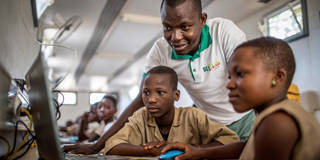At current rates, about 20% of children in Sub-Saharan Africa will still be excluded from schooling in 2030. But, besides seeking to expand access to education, policymakers should contextualize, simplify, and democratize school curricula and teaching methods.
KAMPALA – International concerns over the state of education in Africa center on the large number of children who are out of school – currently about one-third of the global total. But while expanding access to education on the continent must clearly remain a priority, policymakers should also pay much closer attention to what and how children learn.

KAMPALA – International concerns over the state of education in Africa center on the large number of children who are out of school – currently about one-third of the global total. But while expanding access to education on the continent must clearly remain a priority, policymakers should also pay much closer attention to what and how children learn.